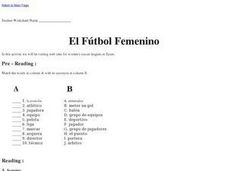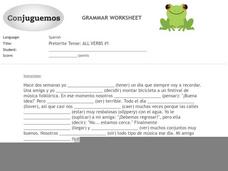Curated OER
El Fútbol Femenino en España
Students use a worksheet to help focus their research on Spain's national women's soccer league. They access primary sources in Spanish and write a journalistic article using their findings.
Curated OER
Hotels in Acapulco
Students explore a website for a hotel in Acapulco, Mexico, answering questions about hotel offers, prices, and special activities. They prepare a skit between family members, or prepare an ad for a hotel.
Curated OER
Latinos in the United States of America
Young scholars explore a website about Latinos in the U.S., and answer worksheet questions about information on the website. They create a puppet show, organize a press conference, or create a brochure regarding Latinos living in the U.S.
Curated OER
The Weather in South America
Students conduct Internet research on weather and weather conditions in South America. They read a weather report in Spanish, and answer worksheet questions on South American countries and their weather conditions.
Curated OER
The Rainforests
Students visit various rainforest websites and answer questions about the rainforest in Spanish. They create an oral and visual presentation on the rainforests, urging conservation of the rainforests.
Curated OER
The Prado Museum
Students visit the Prado Museum website. They explore the website, answer questions in Spanish, interview a classmate, and compare/contrast various artists' works and the Prado museum with a U.S. museum.
Curated OER
El Ballet Folklorico de Mexico
Students conduct Internet research on the Ballet Folklorico de Mexico. They complete a worksheet answering questions about the Ballet Folklorico, and create an award and write a speech to present to the class.
Curated OER
Tortillas vs. Tortillas
High schoolers compare/contrast Mexican and Spanish tortillas. They conduct Internet research, read recipes, list ingredients for recipes, and correct grammatical errors in a particular recipe.
Curated OER
Fun Along the Way: Technology and the Teaching of World Languages
Students record themselves saying basic biographical facts about themselves: : what their names are, where they live, how old they are, what languages they speak, and what activities they like to do. They practice their presentational...
Curated OER
Hobbies
How many different hobbies can you name in French? Using this question, French classes are asked to list as many hobbies as they can. Although the activities themselves are not included in this teacher guide, you could create them...
Curated OER
Quel temps fait-il?
Hit all the basics with this lesson, focusing on weather, greetings, and dates! Start by singing a weather related song ("Quel temps fait-il by Barbara MacArthur is suggested), and then read a story about getting ready for school. The...
Curated OER
Vínculo entre la escuela y el hogar: el cuento
Build oral fluency in your young, native Spanish speakers. First, an adult reads a short passage to their youngster. Then, the youngster practices reading the passage multiple times. Then, after they perfect the passage, they record 10...
Curated OER
Escribir para Educar
Aligned with the Common Core writing standards, this resource has Spanish language learners create a question, write an explanatory paragraph, and identify the main points. You can either suggest an overarching question for your class to...
Curated OER
Entiéndelo en Conjunto: ESCRIBE
Write with a purpose! Get your Spanish class to practice explaining a topic to a specific audience. Either assign them a topic, or let them choose. Then, give them this sheet to help them plan their explanation. They answer three...
Curated OER
Intermediate French Review: Matching
Match the French word or phrase on the left to its English counterpart on the right. This online worksheet provides practice for those learning French. Title claims it assesses the allez and venir verb forms, but vocabulary items are...
Curated OER
Preterite vs. Imperfect #9
What is the difference between the preterite tense and the imperfect? Compare the two, and then give your class this practice half-sheet. There are 12 verbs in parentheses, and your class must decide which should be in the preterite...
Curated OER
Preterite Tense: irregular verbs
Learning irregular verbs are tough since they don't follow some sort of pattern. Use this as a bell-ringer or an exit ticket to determine how much your class understands the challenging verbs in the preterite tense. Verbs like traer,...
Curated OER
Direct Object Pronouns #2
Distribute this quick practice sheet to your Spanish classes after introducing direct object pronouns. The 10 questions provided are short and simple, and the answers are even started for you!
Curated OER
Food
Review food related vocabulary with your Spanish speakers. Learners must translate the 32 Spanish sentences and identify their correct translation in the four options provided.
Curated OER
Counting in Espanol
Pupils create a mini-book with the Spanish numbers 0-10, then compare and contrast the English numbers to the new Spanish numbers.
Curated OER
Present Tense: Stem-Changing Verbs #2
Remembering how to conjugate stem-changing verbs is always a challenge. It requires a lot of conjugation practice to burn those patterns into your memory! Use this half-sheet as a bell-ringer or complete it as a class.
Curated OER
Por vs. Para #3
What do the words por and para mean? Define them with your beginning speakers. Then, after they have examples to look at, give them this practice sheet. There are only 10 sentences to complete, but it will develop their understanding of...
Curated OER
Present Tense: All Verbs #2
Practice, practice, practice! That is the only way your Spanish language classes will learn how to conjugate verbs in the present tense. Give them this short activity as a bell-ringer or an exit ticket to assess their development.
Curated OER
Preterite Tense: All Verbs #1
Practice conjugating! Beginning Spanish speakers read the short paragraph, conjugating the verbs in parentheses. All verb types are included, so there are -ar, -ir, and -er verbs to conjugate in the preterite tense.

























